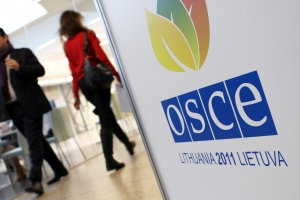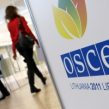
Russia More Equal Than the Rest In Karabakh Conflict-Resolution Group
Publication: Eurasia Daily Monitor Volume: 8 Issue: 228
By:

The OSCE’s year-end conference spotlighted the ineffectiveness of the “Minsk Group’s” co-chairs – Russia, the United States, and France – to mediate a solution to the Armenia-Azerbaijan conflict. The OSCE is the only international forum officially authorized to mediate a solution to this conflict. The Minsk Group (named after an initial meeting’s venue) was born in March 1992 within this organization. Almost 20 years later, the OSCE’s 2011 year-end conference in Vilnius had to register the continuing deadlock. Perhaps the most charitable assessment is that the conflict would be even more difficult to handle without the discussions in the Minsk Group.
Russian Minister of Foreign Affairs Sergei Lavrov, US Secretary of State Hillary Clinton, and French Minister for European Affairs Jean Leonetti (substituting for Foreign Minister Alain Juppe) urged Yerevan and Baku, on behalf of the mediating countries, to continue the “negotiating process” in the same format. Negotiating process, however, is understood to mean the opposite of result-oriented negotiation (Joint Statement by the Minsk Group Co-chairing Countries with Armenia and Azerbaijan, OSCE Ministerial Conference, Vilnius, December 6).
The Minsk Group’s co-chairs seem to agree that “continuation of the status quo is unacceptable.” Nevertheless, this group has itself become an element of that status quo and, in practice, a contributor to its perpetuation. Russia is not interested in resolving, but rather in conserving this conflict. All three mediators claim that they cannot prescribe solutions, but would support a solution agreeable to both Yerevan and Baku. This approach enables Yerevan to play for time and preserve its territorial gains inside Azerbaijan.
The ethnic cleansing of those territories (some 10 percent of Azerbaijan’s population, one of the heaviest refugee burdens worldwide) remains unaddressed internationally.
Russia blocked a resolution on Refugees and Forcibly Dispersed Persons at the OSCE’s year-end conference. The Lithuanian chairmanship promoted this cautiously phrased document, marking the 60th and the 50th anniversaries of the relevant international conventions, and referencing some OSCE resolutions from years past. It did not identify perpetrators or victims, and stopped short of proposing remedies. Russia nevertheless vetoed the draft resolution (OSCE Ministerial Council Documents, December 6).
Within the OSCE, the Minsk Group has experienced a continuing process of upward delegation of authority and narrowing-down of its leadership. The organization’s 50-odd countries originally designated the Minsk Group of 13 countries (including Armenia and Azerbaijan), mandating it to negotiate toward a peaceful settlement of the conflict. The Minsk Group later designated the Russian-US-French co-chairmanship (since 1997 in this shape) to mediate between Armenia and Azerbaijan. The US and France ultimately conceded the role of lead mediator to Russia in 2008, drawing their conclusions from the Russia-Georgia war.
During 2009-2011, Russian President Dmitry Medvedev and Minister Lavrov hosted serial meetings with their Armenian and Azerbaijani counterparts, aiming to draft a general framework (“basic principles”) for a negotiated settlement of the Karabakh conflict. The US and French presidents, Barack Obama and Nicolas Sarkozy, endorsed Medvedev’s mediation through public statements during various summit meetings with the Russian president.
Meanwhile, the Minsk Group’s three co-chairs are acting jointly at the ambassadorial level. But the real action has moved to the top level in Russia, with Medvedev and Lavrov operating as mediators outside the triple co-chairmanship. Vladimir Putin, now president-in-waiting, seems set to replace Medvedev as lead arbitrator in these negotiations after Russia’s presidential election.
The co-chairs try to maintain a façade of unity and equality of formal status. However, the triple co-chairmanship is clearly asymmetrical by now, its balance tilting in Russia’s favor. This arrangement is not final or irreversible, but has taken shape in practice and by informal consent.
From first among equals, Russia has become “more equal” than the other two mediators by all criteria: level of engagement, frequency of meetings, independent initiatives and leverage building. Russia is Armenia’s ally, with troops in place effectively guaranteeing Armenia’s territorial gains at Azerbaijan’s expense. Moscow, however, can leverage that trump card on Yerevan as well as on Baku in mediating between them.
For its part, France acts in a purely national capacity as a Minsk Group co-chair. France does not represent the European Union in this forum, and does not consider yielding its co-chairmanship to the EU. Given the steady growth of EU interests in the South Caucasus, this negotiating format looks anachronistic without the EU.
In the run-up to the French presidential election, the incumbent President Sarkozy has initiated legislation to criminalize denial of the “Armenian genocide.” Sarkozy seeks to outbid the Socialist presidential candidate, Francois Hollande, who had recently launched a similar initiative, vying for the Armenian diaspora’s votes (Le Monde, December 9). Such gestures are not easily dismissed as short-term electioneering. They do impact on foreign policy and diplomacy, directly provoking Turkey, and indirectly casting doubt on the objectivity of French mediation in the Armenia-Azerbaijan conflict.
Overall, Russia capitalizes on its pre-existing advantages in terms of range of interests and military weight in the region. The South Caucasus is a higher priority for Moscow than it is for Washington. This disbalance of interests plays in Russia’s favor. It can be rectified, however, if the European Union becomes a more active player in this region, commensurate with its capacities and its interests.




